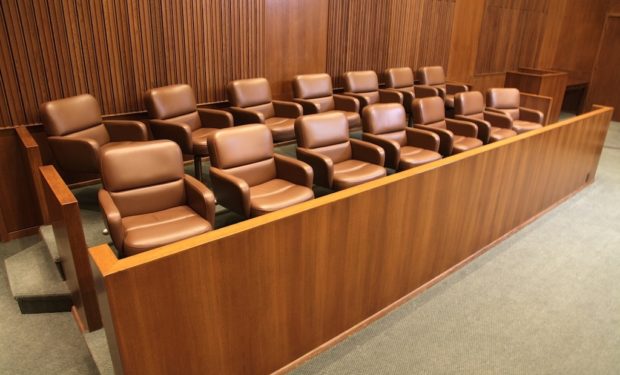Rules of evidence v. Constitutional protections: a battle of authorities
The Supreme Court carves out an exception to the validity of a jury verdict for racial bias in jury deliberations.
In deciding a recent case, the Supreme Court of the United States played referee to a square off between the Rules of Evidence and the United States Constitution. The issue was presented to the Court in early March when Colorado Rule of Evidence 606 (b), as applied in the case of Peña-Rodriguez v. Colorado, ran contrary to the defendant’s Sixth Amendment right to trial by an impartial jury.
Miguel Angel Peña Rodriguez was charged with harassment, unlawful sexual contact, and attempted sexual assault on a child after two teenage girls alleged that he sexually assaulted them in the bathroom of a Colorado horseracing facility where Mr. Peña-Rodriguez worked. At the start of trial, as with all jury trials, the attorneys for the State of Colorado and for Mr. Peña-Rodriguez conducted a voir dire examination of potential jurors. This presents a chance for the attorneys to ask questions of members of the juror pool on various topics in order to narrow the group down to 12 people who can be fair and impartial in deciding the case. During voir dire, potential jurors were asked in multiple contexts whether or not they felt they could be fair and impartial in hearing and making a decision on the merits of the case. None of the empanelled jury members ever expressed a concern as to any bias that may affect their fitness as jurors.
“Mexican men had a bravado that caused them to believe they could do whatever they wanted with women…”
In 2010, that jury convicted Mr. Peña-Rodriguez of the first two counts, but failed to reach a verdict on the attempted sexual assault charge. As a result of the convictions, Mr. Peña-Rodriguez was required to register as a sex offender. Following the conclusion of the case, the judge, in accordance with Colorado law, instructed the jury that they were now permitted to speak with the lawyers or defendant, should they choose to do so. In accordance with usual practice, the attorney for Mr. Peña-Rodriguez entered the jury room to speak with the jurors about the case. Two jurors stayed behind to express their concerns over racist statements made by another jury member during deliberations directed at the defendant and one of the defendant’s key witnesses.
The attorney obtained sworn affidavits from the jurors in which they described the statements made by “H.C.”, a member of the jury and an ex-law enforcement officer. In the affidavits, the jurors claimed that H.C. made the following statements: that he “believed the defendant was guilty because, in [his] experience as an ex-law enforcement officer, Mexican men had a bravado that caused them to believe they could do whatever they wanted with women;” “Mexican men are physically controlling of women because of their sense of entitlement;” “I think he did it because he’s Mexican, and Mexican men take whatever they want; “nine times out of ten, Mexican men were guilty of being aggressive toward women and young girls;” and lastly that he “did not find petitioner’s alibi witness credible because, among other things, the witness was ‘an illegal.’”
After discovering this information, counsel for Mr. Peña-Rodriguez made a motion for a new trial. The trial court denied the motion, citing Colorado Rule of Evidence 606(b) as the basis for their decision. Rule 606(b), mirroring Federal Rule of Evidence 606(b), states “upon an inquiry into the validity of a verdict or indictment, a juror may not testify as to any matter or statement occurring during the course of the jury’s deliberations or to the effect of anything upon his or any other juror’s mind or emotions as influencing him to assent to or dissent from the verdict or indictment or concerning his mental processes in connection therewith[…] Nor may his affidavit or evidence of any statement by him concerning a matter about which he would be precluded from testifying be received for these purposes.”
“The Supreme Court of the United States granted certiorari in the case to determine “whether there is an exception to the no-impeachment rule…”
The trial court, relying on Rule 606(b), determined that the information obtained concerning H.C.’s statements during deliberations was inadmissible to impeach the validity of the jury verdict. The reason for this rule, referred to at common-law as the “no-impeachment rule,” is to ensure finality of verdicts and to maintain secrecy in what occurs during jury deliberations. This is thought to encourage open and honest discussion amongst jurors by eliminating the fear that parties to the case or their attorneys will learn of the statements and retaliate against the jury members as a result. The decision to deny the motion for a new trial was affirmed by both the Colorado Court of Appeals and the Colorado Supreme Court. The Supreme Court of the United States granted certiorari in the case to determine “whether there is an exception to the no-impeachment rule when, after the jury is discharged, a juror comes forward with compelling evidence that another juror made clear and explicit statements indicating that racial animus was a significant motivating factor in his or her vote to convict.”
In deciding the case, the Supreme Court had to consider three separate authorities: Rule 606(b), the Sixth Amendment to the United States Constitution, and precedent cases. The Sixth Amendment, in the pertinent clause, states, “[i]n all criminal prosecutions, the accused shall enjoy the right to a speedy and public trial, by an impartial jury of the State and district wherein the crime shall have been committed.” The defense asserted that the application of the no-impeachment rule to this case is in direct conflict with his Sixth Amendment right to a trial by an impartial jury.
The Supreme Court has been presented with similar conflicts in the cases Tanner v. United States and Warger v. Shauers. In Tanner, the Court refused to admit juror testimony that several jury members consumed drugs and alcohol during the trial to impeach the verdict because it was excluded under rule 606(b). Similarly, in Warger, the Court excluded juror testimony about statements made during deliberations that were offered to show dishonesty in jury selection.
“Racial bias…threatens not only the proceeding in which it occurs, but also the administration of justice more broadly.”
Oral arguments for Peña-Rodriguez v. United States were heard on October 11, 2016. On March 6, 2017, Justice Kennedy delivered the majority opinion, reversing and remanding the case, and announcing the rule that “where a juror makes a clear statement indicating that he or she relied on racial stereotypes or animus to convict a criminal defendant, the Sixth Amendment requires that the no-impeachment rule give way in order to permit the trial court to consider the evidence of the juror’s statement and any resulting denial of the jury trial guarantee.” Distinguishing the facts of this case from Tanner and Warger, the Court held that racial bias in jury deliberations is more serious than the behavior reported in those cases and that it “threatens not only the proceeding in which it occurs, but also the administration of justice more broadly.”
The Court was careful to set out limitations to this ruling by stating that “not every offhand comment indicating racial bias or hostility will justify setting aside the no-impeachment bar to allow further judicial inquiry,” but instead, “the statement must tend to show that racial animus was a significant motivating factor in the juror’s vote to convict.” Though the Court did not set out a bright line rule for lower courts to follow in deciding whether to grant a new trial due to racial bias in jury deliberations, they thought it clear that the statements of H.C. about Mr. Peña-Rodriguez and his witness surpassed the standard, and warranted consideration. The holding of the Supreme Court does not ensure Mr. Peña-Rodriguez a chance at a new trial, but sends the case back to the lower courts with direction to consider the affidavits of the jurors and evidence of juror bias.
Justice Alito, joined by Chief Justice Roberts and Justice Thomas, dissented; voicing concern over the implications that the majority’s rule will have on jury efficiency and verdict finality, citing the reasons for creating the no-impeachment rule in the first place. Despite these concerns, the majority of the Court concluded that a “constitutional rule that racial bias in the justice system must be addressed—including, in some instances, after the verdict has been entered—is necessary to prevent a systemic loss of confidence in jury verdicts, a confidence that is a central premise of the Sixth Amendment trial right.”
A jury pool polluted by racial bias unquestionably presents a severe threat to a defendant’s right to a fair trial. This kind of bias is not easily detected and filtered out through voir dire examinations, so the additional safeguard provided by the rule of Peña-Rodriguez is a positive and necessary step in the direction of preserving justice and constitutional rights.






